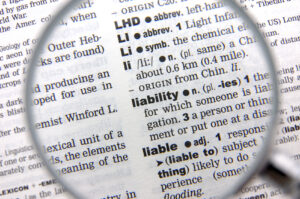
US law recognizes various forms of liability, such as negligence liability, strict liability, intentional tort liability, and vicarious liability. Vicarious liability is unique because it imposes liability on one party for the acts of another party. There are only a limited number of situations under which you can seek vicarious liability against someone.
Employer/Employee Liability

The doctrine of respondeat superior allows you to hold an employer liable for the acts of their employee, as long as the employee was acting within the scope of their employer.
Suppose, for example, an on-duty pizza delivery driver runs a red light and collides with your car. As long as the driver was an employee of the pizza parlor (as opposed to an independent contractor), you can sue the pizza parlor for your injuries.
Employee vs. Independent Contractor
You cannot hold an employer liable for the negligent behavior of an independent contractor unless the employer itself was negligent (through negligent hiring, for example). Independent contractors differ from employees in the degree of independence they enjoy.
For example, a commercial truck driver with their own rig (most truckers) is probably an independent contractor. The same applies to most doctors who work for hospitals. These parties are often well-insured.
Parent/Child Liability
Many states hold parents liable for the intentional misconduct (vandalism, for example) of their minor children. Even without these laws, parents can bear liability for their own negligent supervision or entrustment in relation to their children.
Product Manufacturer/Distributor Liability
Suppose you suffer an injury by taking a defectively manufactured prescription drug. Although you seek to file a lawsuit against the manufacturer, you discover that the product was manufactured in China. In this case, you are not out of options.
By filing a strict product liability claim, you can sue any party in the product’s chain of distribution for a design, manufacturing, or warning defect. If Walgreens was the US distributor of the defective medication, for example, you can sue Walgreens for your damages even though it is not even in the business of manufacturing pharmaceuticals. This is a form of vicarious liability.
Civil Conspiracy Liability
Suppose a group of people agree to perform an illegal act or agree to perform a legal act by illegal means. They might agree to attack and beat someone, for example. One of them buys a pair of brass knuckles in preparation for the crime.
This one act, arising out of an agreement, is enough to complete the conspiracy. After that, every member of the conspiracy can bear liability if any one of them commits the planned attack. This is also a form of vicarious liability.
General Partners
All of the partners in a general partnership bear liability for the misconduct of any of the other partners. This is true, provided the misconduct was committed in furtherance of the partnership business.
Dram Shop Liability
Suppose you suffer an injury in a DUI accident caused by the other driver. You want to file a lawsuit, but the at-fault driver was uninsured and has no financial resources of their own. An investigation reveals that the at-fault driver was drinking at a nightclub shortly before the accident.
If the bartender sold alcohol to the at-fault driver after they were obviously intoxicated, you might be able to sue the nightclub under the state-dram shop law. Most states have these laws, and the majority of them allow victims to hold nightclubs and social hosts liable for serving already intoxicated customers or for serving minors (under 21).
Do You Need a Personal Injury Lawyer?
If the value of your claim is substantial, you probably do. The problem is that you might not even know how much your claim is worth until you talk to a lawyer. That’s not an issue because just about any personal injury lawyer will schedule a free initial consultation for those with promising claims.
You need not worry that you can’t afford to hire a lawyer either. In personal injury law, it’s the quality of your claim that matters. If you’ve got a strong claim, you don’t need a dime to hire a lawyer.
Instead, the lawyer will take their legal fees as a percentage of whatever amount they are able to win for you. If they don’t win, you will owe nothing in legal fees.
Schedule a Free Consultation With Our Personal Injury Lawyers
Our lawyers at Runion Personal Injury Lawyers evaluate each case to determine if punitive damages are justified. We work to maximize the value of your personal injury claim by diligently seeking compensation for all damages. Contact us by calling (602) 600-9000 to schedule a free case evaluation with an experienced personal injury attorney. Our personal injury law offices are located in Phoenix, AZ, and Albuquerque, NM.

